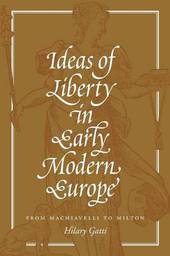
|
Ideas of Liberty in Early Modern Europe: From Machiavelli to Milton
Paperback / softback
Main Details
| Title |
Ideas of Liberty in Early Modern Europe: From Machiavelli to Milton
|
| Authors and Contributors |
By (author) Hilary Gatti
|
| Physical Properties |
| Format:Paperback / softback | | Pages:232 | | Dimensions(mm): Height 235,Width 152 |
|
| Category/Genre | Social and political philosophy |
|---|
| ISBN/Barcode |
9780691176116
|
| Classifications | Dewey:320.011 |
|---|
| Audience | | Undergraduate | | Postgraduate, Research & Scholarly | |
|---|
|
Publishing Details |
| Publisher |
Princeton University Press
|
| Imprint |
Princeton University Press
|
| Publication Date |
28 February 2017 |
| Publication Country |
United States
|
Description
Europe's long sixteenth century--a period spanning the years roughly from the voyages of Columbus in the 1490s to the English Civil War in the 1640s--was an era of power struggles between avaricious and unscrupulous princes, inquisitions and torture chambers, and religious differences of ever more violent fervor. Ideas of Liberty in Early Modern Eu
Author Biography
Hilary Gatti taught for many years at the Sapienza University of Rome. Her books include Essays on Giordano Bruno (Princeton), Giordano Bruno and Renaissance Science, and The Renaissance Drama of Knowledge: Giordano Bruno in England.
Reviews"Gatti offers a lucid primer of some famous and other less well known texts and debates of the period ... an eloquent analysis of the rich tradition of thinking about liberty in the early modern period."--Victoria Kahn, Times Literary Supplement "[An] illuminating book."--Jacqueline Broad, Times Higher Education "[Gatti] offers thorough, sweeping treatments of major figures in this period--Machiavelli, Luther, Shakespeare, Bruno, Milton--as well as many minor writers... Gatti helpfully situates all the discussions of the period in historical context. This book will be useful for upper-level students and scholars of the history of political thought."--J. Church, Choice "Ideas of Liberty is a learned, carefully wrought, and fine-grained study."--Henry C. Clark, Review of Politics
|